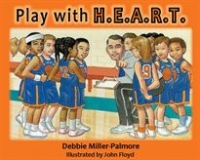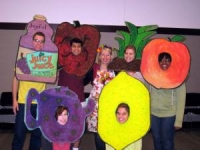Resources
A Resource Guide to Autism
As children's ministry leaders we want our ministry to be welcoming to all children. We strive to create a safe, fun enviroment where all children can learn about God and build their own relationship with him. A friend, Susan Stroebel shared this with me, Resource Guide to Autism it is designed as a tool kit specifically for friends of families affected by autism. I hope you find it as helpful as I did.
12 Simple Ways To Appreciate Your Volunteers
1. Send a hand-written note.
Kingdom Kids Curriculum Frequently Asked Questions
Q&A'sQuestions About the Curriculum
Answers given by various staff members
of the Kingdom Kids Curriculum Project
(Updated May 28, 2001)
General
Q: Some quarters only have 12 lessons instead of 13, what should we do for the 13th week?A: You will receive the next quarter's material before you reach the 12th week. You will find that all of the quarters will have different amounts of lessons. No matter the number of lessons, you will receive the next quarter's material before the lessons are finished.
Q: What would you suggest if a service is greatly extended?
A: In most cases, the activities in these lessons can be extended up to 30 minutes with the suggestions provided in the Conclusion section of each activity. For example, a center that normally runs 20 minutes, could be extended to 30 minutes with a well-prepared discussion or prayer at the end. For extensions of more than 30 minutes, plan to bring in games or activities from previous lessons as a review for the students. The variety will also help keep them busy and not focused on the extra time. You can also plan an extended Snack/Free Play area as well. Think of ways to extend the craft by adding extra decorations, etc. The key, as always, is forethought and good planning.
NOTE: Always prepare to fill more time than you expect! If you expect the service to go an extra 30 minutes, plan to fill 60 minutes.
Q: What about special needs children—those that need one-on-one attention?
A: We suggest that the children's ministry provide someone to help this child. If the child receives one-on-one attention at school, then he should receive it in Bible class as well.
Q: What time length do you recommend for the activity centers?
A: Please see page 2-22 from the Kingdom Kids Conference Notebook for a recommended schedule of center activities. The average recommended time is 20 minutes. Most lessons for school-age children can be easily extended for up to 30 minutes using the suggestions for discussion and prayer contained in the Conclusion section of each activity.
Q: Is there a problem with a teacher providing the snack (rather than the students bringing their own)?
A: Either way is fine. If the teacher would like to provide the snack, that is great. The only thing to be careful about is any food allergy a child might have.
Q: Should we enforce a "too late to sign in" rule?
A: This is a decision to make with your ministry leader. If lateness is a problem, the "cut off" rule can be an effective way to correct it. Spend four weeks keeping track of the number of children arriving late, and review this information with your ministry leader. Announce to the church (and in the bulletin) that beginning on a given date, a cut off will be enforced in which children will not be allowed to sign into class. Explain that children arriving more than 20 minutes after the start of worship not only disrupt the class, but also the parents disrupt the worship. Exceptions should be considered for first-time and other visitors, the physically challenged (in some cases), and additional situations that the CMLs should be made aware of in advance. The purpose of the cut off is not to punish, but to help families be successful and to set the children up for success.
NOTE: It is very important to know when to show "grace," such as special "Bring Your Neighbor Day" services and days with foul weather or seasonal time changes.
Q: Are handwritten note cards/cue cards okay for telling the Bible Story?
A: Yes. As long as you are not reading the story to the children, but telling it to them.
Q: What do you do when you don't have enough rooms for each class or if the rooms are too small?
A: Centers can be taught in a corner of a room, or under a stairwell. The key is space management. In some cases, centers promote the most effective use of small spaces. In a small room with 15 two-year-olds, we had two small groups arranged on small rugs in opposite corners and one group in a circle in the middle of the room. Containing three small groups of 5 in this small space was much more effective than having all 15 children in a large group. In fact, the teachers who had tried the large group approach were amazed at the control and success achieved by the small group setting.
Centers also permit different age groups to be in the same room. For example: in our cafeteria, four different age groups are together. Each group takes one quarter of the cafeteria and creates boundaries with chairs and tables. Then, within each age group, the class is divided into centers. We have seen classes for 120 children (4 age groups of 30 children) divided into 16 centers (4 per age group) run very successfully—noisily but successfully!
NOTE: Even in small spaces, physical barriers make a huge difference. Chairs lined up and covered with a bright sheet or tablecloth can create a barrier that makes both the teachers and the children feel like they have their "own" space.
Q: How many children should be in a center? How many is too many or too few?
A: In most cases, you want to have any number between 5 and 10 children. Centers will work with 3 or 4 children, but they will be difficult in activities that involve "team" activities. They can also work with more than 10, but in that case there should be at least two adults assigned to the activity: the center teacher and an assistant.
Q: Do you have the full-time ministry staff work in the Kid's Kingdom?
A: Yes. Our ministry staff has been very supportive of the children's ministry. The women's ministry leaders from two sectors have both served for 6 months at a time. One served as an assistant with the 2 and 3 year olds, one was the lead teacher for our preteen girls class. We have also been able to use our ministry interns, both singles and marrieds. It makes such a difference to have the maturity and spirituality of these men and women in the fellowship of teachers!
Q: On the same Sunday, are all age groups being taught the same lesson?
A: Not generally. If you look at the Scope and Sequence you will see that, although all age groups begin with “Creation,” each age group goes its own path afterward. There will certainly be repetition and overlap, but the lessons do not track together.
Q: Is a schedule available so we will know which lesson we should be doing on a given date?
A: Yes, please write to This email address is being protected from spambots. You need JavaScript enabled to view it. and we will send you the schedule.
Q: We have not used centers in our children's ministry. How would you run it? We have one lead teacher and that teacher has helpers. Would you allow the helpers to take responsibility for centers? Or would we need 3 teachers in the younger classes?
A: For a detailed explanation of how Centers work, please see pages 2-21 and 2-22 of the Conference Notebook.
In your case, you would divide the children into three groups, and designate three people to lead each activity. Centers are small groups that rotate in such a way that each child participates in each center. It does not matter in which center the child begins, as long as he attends each one in the course of a class period. In a class with one teacher and three helpers, I would recommend making the one teacher a "lead teacher" to prepare the Bible Story (or Life Application) Center and assign the helpers to prepare the others. In the case where a helper is unable to prepare an activity, divide the activity preparation among those who can. (The CMLs will need to judge whether a helper is able to effectively lead a group of children in a center activity.) If this is not the case, then the lead teacher may lead most or all of the activities with the assistance of the helpers.
NOTE: Learning Centers are a great way for inexperienced helpers to be with children in a small group center where control is easier to maintain. Preparing the centers helps build the helper's confidence. We have seen many helpers grow into the role and responsibility of a teacher.
Q: What do we do if core- and supplement-use pages are back-to-back?
A: After the first quarter, this will not happen. It was an oversight on our part. At this point, though, the children's ministry leader and the teachers will have to work this out.
Q: How do I know how many copies to make of each reproducible page?
A: In order to make the task of copying reproducible pages easier, we have included on each reproducible page the following information:
Core or Supplement/section/number of copies needed
(example—Core/Bible Story/1 copy for each student)
NOTE: Although it is not specifically stated, always make a copy of the reproducible page for the teacher.
Q: Can I get a list of all the materials needed for a lesson?
A: At the beginning of each preteen lesson, we list the materials needed for all the activities for the entirety of the lesson. We do not have the space to do that on hard copy for the other age groups. However, you can find all the materials listed online under Materials.
Q: It seems the school age units start at a different time than the preteen. Are we supposed to be on the same schedule?
A: Remember that not all quarters have 13 lessons. Some have a few more and some have a few less. (The overall number of lessons for the year is 52.) Do not skip lessons just because a new unit has been given to you by the children's ministry leader. And don't think that there is a problem if you need your next unit before someone in another age group needs theirs.
Preschool
Q: What do you do if you only have two 4-5 year olds?A: Depending upon the age, you can have them join either the next oldest or next youngest group. If they are 4, having them join the 3-year-olds with the added responsibility as a class helper will assure the child's success. If they are 5 or 6, then have them join the 1st and 2nd grade class and be sure to adjust activities accordingly so that they are able to complete them. You could also arrange to have an older child in the class be a buddy who helps them.
Q: We have several 4-5 year olds that need one-on-one teachers, but we don't have the resources. What do we do? I hate to have to turn them away because they need the love and support of the children's ministry.
A: It depends upon why they need the one-on-one attention. If it is because they tend to be hard to control during class, then you may want to try keeping them in the class with the new curriculum and be sure to run the class in centers. One of the benefits of using centers is that they keep the children involved and help prevent discipline issues.
If the children receive one-on-one attention in the school system and have been coded in some way, then you need to talk with the parent. Get some ideas from that parent on how to help the child to be successful in class. Ask them what is done at the child's school.
Q: School age kids would move from 1st-2nd grade to 3rd-4th grade in the summer. How about moving from 2-3 year old class to 4-5 year old class? Do they move on their birthday? Do they move in small groups? What do we do if a 2nd grader is retained in school—do we also retain them?
A: Each of these questions should be decided based on what is best for your ministry.
School Age: We move our school-age children at the end of the summer. This works well because that is when the 4th graders are moved into the preteen class for preteen camp. Other ministries choose to move the children in June.
Preschool: We move children on their birthdays with a 2-week transition period—one week to say good-bye to the current class and one week to prepare the new class for a welcome.
Q: Are there Easter lessons for each year?
A: Unit 8 Lesson 5 and Unit 19 Lesson 5 are the Easter lessons.
Q: For the 2 and 3 year olds, is there a particular lesson that is good for Thanksgiving?
A: Unit 15 Lesson 5 is a Thanksgiving Lesson.
Q: I can’t find the song sheet for Unit 5 in Quarter 3 for the 4-5 year old class. Does one exist?
A: A song sheet was accidentally left out of Unit 5. Here are the songs:
Andrew and Jesus Finger Play
Andrew and his friend were standing by the street,
(Move the Andrew and friend finger puppets.)
Along came Jesus and then there were three.
(Move the Jesus finger puppet.)
"Come along," he said, "and you will see.
Won't you spend the day with me?"
"Oh, yes. Oh, yes," the friends replied,
(Move the Andrew and friend finger puppets.)
"You will see where I reside."
(Move the Jesus finger puppet.)
They spent the day having so much fun.
(Move all the finger puppets together.)
Jesus loves to be with everyone!
He's on His Way
(Tune: Grandpa's Farm)
He's on his way,
He's on his way,
On his way to Galilee.
He's on his way,
He's on his way,
On his way to Galilee.
School Age
Q: Can one teacher teach the entire lesson when you have a small number of children?A: Yes. It will require more preparation, but it can certainly be done. In that case, teach the lesson in the order given in the Lesson Plan on the "Lesson at a Glance" page. In most cases, a teacher should have at least one assistant to ensure the two-person rule (unless the other person is teaching another group in the same room). Give the assistant responsibility for at least one of the activities. (Also see the response to the next question.)
Q: Would it be too much for one person to teach the school-age curriculum alone? We are only able to have 2 teachers between these 2 age groups. There are between 4-6 kids in each class.
A: In your situation, I would suggest that you have both teachers and both age groups in one class, but in different parts of the room. Have the 1st and 2nd grade lead teacher with that group and the 3rd and 4th grade lead teacher with the other. The question of "too much" depends on your teachers and how much they are willing to prepare. To offset the amount of preparation, solicit help from the parents to prepare the pre-class and craft activities. Set up a rotation of volunteer "Parents of the Month" for each age group to help with the weekly lesson preparation. That way, the lead teachers can focus on the activities that require more involved presentation such as Bible Story and Scripture Memory (in the Core lesson) or Life Application and Bible Skills (in the Supplement lesson). Since each set of lessons contain integrated materials, it would be hard to "combine" these age groups without losing the full effect of the lessons.
Q: What would you do with illiterate school-agers who couldn't keep up with word/phrase related activities? We held them back in younger class for one year, but still the child has not shown any reading or writing skills. One child is ready to go up to 3rd grade class, however, he couldn't even follow 1st-2nd grade curriculum for a year. How should we address their parents or prepare teachers?
A: These should be handled on a case-by-case basis. Each child and his or her family present different concerns. Hold a meeting with the parents, the Bible class teacher and the children’s ministry leader. (If it is appropriate, arrange to have the child's schoolteacher present for additional input. Use this as an opportunity to reach out!) Talk about what the child is doing in school and how they are addressing the child's needs. Can these same things be done in Bible class? Is the parent willing to come to class during activities that may potentially frustrate the child? Can another child in the class be identified as a "mentor" figure to offer extra help? If the child is willing to be in a younger class that is better suited to his academic needs, then make arrangements with that teacher. Make sure that the teachers and assistants do not allow other children to make fun of the older child. Talk with disciples in your church who work locally in special education. Have a learner's attitude and pray for wisdom!
Q: School age kids would move from 1st-2nd grade to 3rd-4th grade in the summer. How about moving from 2-3 year old class to 4-5 year old class? Do they move on their birthday? Do they move in small groups? What do we do if a 2nd grader is retained in school—do we also retain them?
A: Each of these questions should be decided based on what is best for your ministry.
School Age: We move our school-age children at the end of the summer. This works well because that is when the 4th graders are moved into the preteen class for preteen camp. Other ministries choose to move the children in June.
Preschool: We move children on their birthdays with a 2-week transition period—one week to say good-bye to the current class and one week to prepare the new class for a welcome.
Q: Why, for the younger classes, is it recommended that you only give the teachers a unit at a time, rather than the whole unit at once?
A: In the preteen workshop at the KK Conference the leaders suggested that the CML give the Core teacher and the Supplement teacher all their lessons for the full quarter. But in the other two workshops, the leaders recommended giving out the lessons a unit at a time. Of course, it is up to your particular ministry how you want to handle this. The main reason the preschool and school-age workshop leaders suggested a unit at a time is to manage and hold on to the lesson cards. In these age groups the cards are handed out to the different center teachers and gotten back from them. Closer supervision and more accountability could help you to keep up with these cards more easily. The preteen teacher will not be handing cards out to anyone for the most part because they do not use the centers approach.
Q: For the 1st and 2nd graders, is there a lesson that would be particularly good for Special Missions?
A: Unit 7 Lesson 4 The Samaritan Woman—this is one of the Special Feature Mission Lessons that focus very directly on World Missions. The children will be encouraged to think of ways that they can be a part of their churches' world sector missions. Work with your teachers and leaders to identify the different mission points in your world sector and make it real to the children.
Q: Is there a particular lesson that would be good for Easter for the 1st and 2nd graders?
A: Unit 8 Jesus Gives Life—This unit features events surrounding Jesus' death, burial and resurrection. Each lesson is designed to make these events vivid and memorable for a lifetime. Encourage teachers to meditate on the Scriptures and pray to make Easter a life-changing time for their children.
Q: In my 1st and 2nd grade class, we have diverse reading skills. Any ideas how to set them all up for success?
It is very important to remember that these children are coming to you as beginning readers or, in most cases, non-readers. Throughout the units, plan ways to pair your new first graders with returning second graders. This will help them to build new friendships and give the older children a great chance to help their younger classmates.
Many of the activities are designed with the beginning reader in mind. Talk with other teachers or children’s ministry leaders about ways to make these activities more challenging for the older children in your class.
Preteen
Q: During a Sunday Service our preteens meet with the adult service until after communion, then they leave at the fellowship break, which is usually around 10:45am. This only leaves approximately 45 minutes to teach the core lessons. Is this enough time? If not, what would you suggest we do?A: I would suggest that you talk with the leaders and let them know that the curriculum was written assuming you have the full worship time with the preteens. Since the material is written on their level, their attention is more easily kept. Some preteens might be mature enough to get something out of the service, but others would do much better with a time that is geared more clearly to their needs. There is also the need for these kids to build strong relationships with each other that will carry them through the teen years. The more time they have together learning and interacting, the better.
Certainly, if after talking with your leaders and showing them the scope of the preteen lessons, they still feel strongly that they want the preteens in the worship service, you will have to make decisions as to what you will teach. In each lesson you will need to drop an activity or aspect.
Q: With the preteen curriculum's emphasis on quiet times and challenges, any suggestions for drawing in visitor's children—possibly a copy of the quiet time for the week?
A: Since the follow up on the quiet time book will not be extensive, the visitors will not need copies of the quiet times. They will be given a memory verse Reproducible Page on Sundays that also has the weekly challenge on it. Hopefully, if they continue to come (either with a friend or with their parents), you can give them a quiet time book.
Q: Since the preteen curriculum does not have learning centers, how should the teaching responsibility be shared?
A: This is up to the individual ministries to make this decision. Our suggestion is to allow different teachers to take responsibility for aspects of the lesson. That way, everyone feels needed and useful, and the main teacher is not overloaded with responsibility.
Q: Where do we find “good news from the kingdom”?
A: Good news from the kingdom can be found on the www.upcyberdown.org, www.kingdomnewsnetwork.org, www.acesonline.org or any other church Web site. Also, you can be creative and have anyone visiting from another congregation share some encouraging things that are happening back home.
Q: How can we help the preteens keep up with their reproducible pages?
A: You may find it helpful to supply each preteen with a folder to place their reproducible pages in for each quarter.
Q: Are the preteens supposed to doing quiet times from Extreme Life?
A: Yes, and don't forget to ask them how their quiet times are going. We have reason to believe that some parents are not following up on their children's time in the Word. You could even have the students bring their books to class to raise the profile of its importance.
Q: Our preteen class definitely has “cliques” and favoritism. Are there any lessons to help with this?
A: Unit 7 of Quarter 3 is on friendship. This would afford a great opportunity to discourage cliques in the preteen group.
Q: Are there any lessons to help the preteens have a spiritual mindset about dating?
Unit 9 of Quarter 3 is on God's plan for the family. Please be aware that in Lesson 2 on marriage the supplement contains material about dating. The teacher is to make sure the students understand that they are not being encouraged to date at this young age. Instructions to the teacher are as follows:
· You should remind your students at this point that they are still too young to date. However, this lesson will help them develop the convictions they will need in order to have great dating relationships when they get older.
Because of the media input the preteens are exposed to, this lesson includes a discussion about the importance of purity in dating relationships. Ministry leaders may want to know that this material is included so parents can be advised.
Q: Sometimes the preteens in class ask me questions about science that I am unsure how to answer. Any suggestions?
A: In Unit 11 we deal with scientific subjects. Please read the cautionary notes for the teacher from Richard Newman, Biblical Accuracy specialist for the Kingdom Kids Curriculum Project:
There is a special thrill for disciples when we hear news items such as these:
· "Observing the variations in the universal background microwave radiation is compared by their discoverer to 'seeing the breath of God.'"
· "Further excavation of the city of Jericho suggests that something very unusual happened to the city walls, something that cannot be explained by natural phenomena."
· "Analytical research of DNA samples suggests the entire human race has a single female ancestor."
If such things build our faith, then does it hurt our faith to hear these things:
· "The ancient flood at Ur, once believed to prove the story of Noah, was found to have been only a small flood."
· "The ruins once touted as ‘Solomon's stables’ are now believed by some to be merely the remains of storehouses."
New finds which illuminate Bible events have special meaning for Bible believers; yet our faith is not to rest on such things. We must be especially careful to communicate this to the children we teach, to equip them to grow in and defend their faith without being devastated should some peripheral evidences be found to be false.
Archaeological finds in particular are open to many possible interpretations. We must be careful not to accept at face value and repeat every claim that is made. Some of the claims found in popular books and on the Internet are clearly not supported by the scholarly literature, or have been reinterpreted in light of more recent finds. This is not to say that scholars are always right! Some writers have an ax to grind, seeking from the start to "prove" that the Bible cannot be accurate; others overreach, setting forth questionable conclusions to "prove" the Bible is accurate.
Archaeology cannot be used to prove or disprove miraculous events. It can help us understand where and how people lived during Bible times. The fact that any evidence has been found of people living thousands of years ago is amazing! One of the most even-handed treatments of Biblical Archaeology we have found is Treasures from Bible Times, Alan Millard. (Lion Publishing Co.) Belleville, Mich.: 1985. More information may be found at your public library. Allow several weeks if you need to obtain books through interlibrary loan.
Kingdom Kids Curriculum - Now Available!
Click here to purchase the Kingdom Kids Curriculum at DT Media Shop >For more information contact Vicky Bergem at This email address is being protected from spambots. You need JavaScript enabled to view it.
What’s Pinterest?
Pinterest helps people collect and organize the things they love.
Pinterest is a tool for discovering things you love, and doing those things in real life. Ben Silbermann, Evan Sharp and Paul Sciarra co-founded the site in March 2010.
Since then, they have helped millions of people pick up new hobbies, find their style and plan life’s important projects.
Pinterest & Kingdom Kids
Pins can be almost anything—a gift, recipe, or even a quote. They’re like little bookmarks people add to Pinterest that always point back to the sites they came.
I use pinterest to collect ideas for Kingdom Kids, Crafts for Christmas, Easter and other holidays.
The things I have pined are not my ideas just things I have found and liked that other people have created. Worth Checking Out.
Go to Pinterest.com - you can look me up Vicky Bergem and see what I have found. You don't have to be a creative genious with Pinterest, someone has done it for you!
Interested in helping us facilite a Pinterest Site just for Kingdom Kids email me This email address is being protected from spambots. You need JavaScript enabled to view it.
Thanks for taking the time to read this.
Vicky
Cool Music For Kids
Great Music for Everyone! The children in our ministries love love love this music. It is certainly a favorite in our house. On any given day you can see my four and eight year old rocking out to the tunes. It is also what we play in the car especially on the way to church to help set our minds on God. Check it out! I don't think you will be disappointed. GoFishGuys.com, www.youtube.com/watch?v=63UlqUyg8F or find them on Itunes. The Go Fish Guys are not members of the International Churches of Christ. We just love their music. Play other great tunes in your Children's Ministry? Share it with us. This email address is being protected from spambots. You need JavaScript enabled to view it.New Children's Book - Play with H.E.A.R.T.
New Childrens Book! |
|||||||||
| |
|||||||||
|
|||||||||
|
Fruity Tunes and the Adventures of Rotten Apple
Fruity Tunes and the Adventures of Rotten Apple
Through props, songs, Bible verses and a story of good overcoming evil (stories for kids often need a villain, right?) this little story started to come alive. I tested the story/play with my grandchildren – and they loved it. I believe children are so eager to learn. After recruiting some high school and college students with lots of energy, great voices and a shining example we were able to teach and entertain hundreds of children. (Juicy Juice has since been retired and replaced by Smiling Strawberry)
The story was so well received that I decided to put it in a book. This book is particularly designed for children ages 3 to 10.
You can order ($8) from https://www.createspace.com/3888052
Tuesday, 16 April 2013 13:38
New Family Devo Cards
See the new "Deck of Devos" and other great new Christian products!
XCED Releases Children’s Book Addressing Complexities of Special Needs Relationships
One of XCED’s core beliefs is the importance of inclusion. One in eighty-eight children is on the autistic spectrum. One in eight has an anxiety disorder. Statistics show that autism is now more common than cancer. Many children with special needs have a brother or sister who may not know how to handle all the emotions and questions that come from growing up with a sibling with special needs. In 2012 several members of XCED published a children’s book entitled, “Better Together”, which addresses the complex emotions surrounding growing up with a sibling who has special needs. These teens know firsthand what it feels like to experience the joys and challenges of having a brother or sister with special needs.“Better Together” is a book intended to start conversations between parents and children about maintaining relationships through every hard situation, circumstance and emotion. Despite their differences, these siblings are actually “better together.”
“Better Together” is available today on the Apple bookstore for iOS devices (iPod Touch, iPhone and iPad) for $2.99. Grab your copy today!







